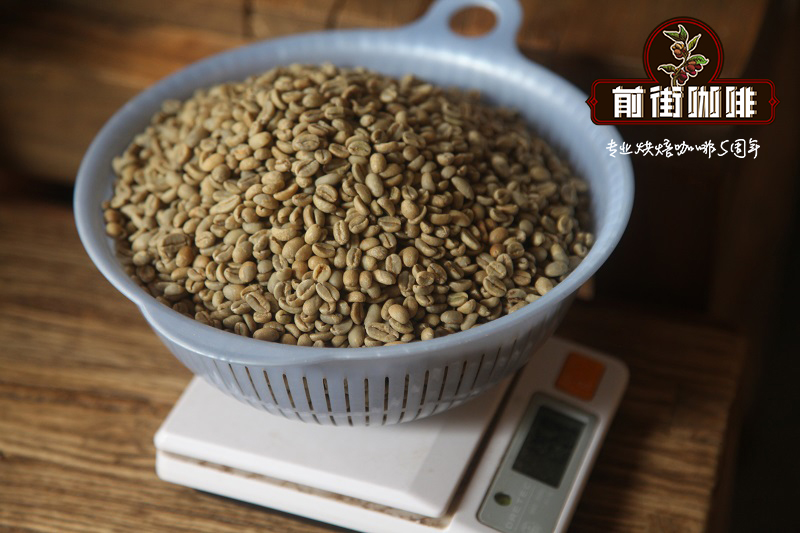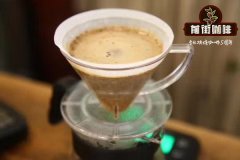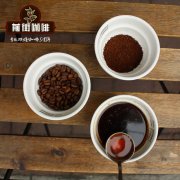What is Ninety Plus 90 + | Ninety Plus 90 + rating details

"90 +" does not refer to all coffee with a rating of more than 90 points, it refers to a selection of top coffee series.
They are produced in different manors and have different flavor characteristics. When processing, baristas will separate these coffees according to variety, climate and maturity and taste them one by one. They are like works of art that tend to be perfect. Baristas take great pains to make them taste the best and present them in the most perfect posture.
90 +'s pursuit of the ultimate flavor is very admirable, and their sustainable development model and environmental protection operation are also the learning goals of many coffee producers. Since the company was founded in 2006, the young company has made them known to coffee industry people all over the world in just a few years. The coffee series that made its debut in 2007 was immediately regarded as a precious show by coffee experts.
Since 2006, Joseph Brodsky, founder of Ninety Plus, has decided to change the deep-rooted commercial coffee growing model. Ninety Plus sees an opportunity to grow cool and delicious family heirlooms while growing tropical land, while creating a new model to inspire and improve the quality of life of its coffee growers.
The Ninety Plus team currently owns more than 1500 hectares of coffee forest restoration projects in Panama and Ethiopia and has established an international brand to promote the success of a taste-driven model for an eco-and socially oriented agricultural economy.
Joseph Brodsky, the founder of 90 +, discovered early that all the world's high-quality raw coffee beans originated in Ethiopia, and its different flavors of many different varieties are no less than 10, 000 grapes into 1 million different wines.
Ninety percent of the raw beans come from the original varieties of Ethiopia, including Gesha of Manor Panama, which is also transplanted from the original variety of Ethiopian heirloom (Heirloom). The processing process is the specialty of 90 +. It will separate these coffees according to variety, microclimate and harvest time, taste them one by one, and specially design processing methods for each taste to achieve a taste characteristic, just like big-name designs. Study hard and spend painstaking efforts to complete a handicraft that is close to art. Natural products go through a lot of refinement and improvement, and finally reach the most beautiful posture to present the content to everyone.
In order to ensure quality, 90+ adopts a cooperative model with local manors, from planting, sampling and harvesting to subsequent processing and cup testing. 90 + exclusive Profile Processing ensures that each coffee bean has a unique and stable flavor trend and quality, while 90 + coffee is unique in the market like premium red wine.
At the beginning, the 90 + company only bought the best quality coffee cherries from Ethiopian coffee farmers, and started with the best ready-made beans, so there were 90 + representative beans: Aricha and Beloya, which became famous in the first world war, but the experimental results were amazing, and the whole boutique coffee circle was shocked by the rich fruit flavor and high texture.
As coffee gradually moves towards the high-price boutique market, 90 + is the first to establish its own raw bean production system-Profile Processing.
Select the potential coffee farmers, set the ideal flavor back to the bean farmers and processing plants according to the current coffee beans, carry out process reengineering, and gradually revise the samples to the original flavor of 90 + by scientific management. but of course, it is necessary to carefully select the one that best meets the setting before it can be produced.
Profile Processing simply means to extend the scope of management upstream, from the varieties, producing areas, climate, planting methods, harvesting and treatment methods of coffee farmers. If you control all of them, you can produce super-high-quality coffee beans according to your own preferences. The reason why the Profile Processing system is so powerful is that it has the technology to control flavor performance in hand, so it can plan and set the highest standards and surpass the general raw bean merchants' chance to select and buy raw beans. The quality exceeding the standard is not luck, but the average standard, which is also the core value that 90 + companies have always adhered to.
The nomenclature of 90 + beans is completely different from that of general boutique beans. First of all, unlike the usual names of producing areas and manors, each bean is named according to its flavor, for example, the famous Nekisse is originally intended to be taken from Shakisso's nectar.
The name of 90 + usually starts with the concept of flavor, then the name, and then the choice of producing areas and cooperative farms. In this respect, it is very different from the general boutique beans and is a brand with boutique management style.
It is not difficult to find that usually beans have the letters N, H or W, such as Ethiopian Yiagacheffe G3 N, which is commonly seen in the market, where N stands for Natural. H = Honey (honey treatment) and W = Washed (washing). Here, 90 + also has a different view, they think that rather than using the method of treatment to distinguish beans, it should be distinguished by the trend of flavor. Generally speaking, each treatment of beans will have a more representative flavor, such as:
Insolation: unrestrained fruit aroma
Honey treatment:: the sweetness is outstanding.
Washing: the flavor is relatively clean
However, 90+ believes that sometimes there will be the same flavor trend under different treatments, for example, the flavor performance of beans treated with honey may be similar to that of washed beans, so they have introduced three basic flavor labels of N2, H2 and W2, which are distinguished by the intensity of fruit aroma and taste:
W2: (Low) low fruit tonality, emphasizing brightness, acidity and floral aroma
H2: (Moderate) moderate fruit tonality, emphasizing sweetness, fruit taste (non-aroma) and tea flavor
N2: (High) strong fruit tonality, emphasizing unrestrained flavor, sweet and sour, jam and dried fruit.
90 + Ninety Plus grading
90 + beans also have a scoring system that is different from the usual 100 points. Raw bean merchants can have their own scoring criteria, and their grades are based on three factors: flavor, cost and output:
In addition to its own flavor symbol, each bean has its own grading method, which is quite different from that of other countries, and is divided into the following levels.
L7 、 L12 、 L21 、 L39 、 L95 、 L195
L means Level, and the classification is based on the quantity of production, the refinement of processing, the degree of difficulty and the rigor of screening.
Level 7: harvested in a single production area. The rare varieties with meticulous taste and special flavor are selected by hand and then treated by NinetyPlus to reach the standard of more than 90 +.
Level 12: harvest in a single production area. Negative adjectives such as "must be recognized and indelible" are used on the website to indicate that this grade of beans must be a good taste that every coffee maker will never forget.
Level 21 (L21), Level 39 (L39), most of these are Gesha varieties planted in Panamanian manors. Ethiopian Nekisse Red processed by special Red also belongs to Level 39 (L39).
Level 95 (L95) and Level 195 (195) are beans in the advanced microenvironment of the Panamanian manor, which are processed by patented drying technology after a long screening process. Reach the top taste standard in the design. Most of them will be processed under the personal care of the sponsor Joseph. The annual output may only reach about ten to dozens of kilograms. It's a collection.
L7, L12: most of the Isabia beans are in this grade, and the flavor is already very good, no matter the aroma or texture is impeccable. This grade of 90 + can be said to be an entry-level commodity with a fairly good CP value.
For example: Tchembe and Kemgin are the original L7, Nekisse and Hachira are the original L12.
L21, L39: this is almost the world of Geisha coffee in NPGE Manor, it can be expected that for 90 +, the Geisha variety itself is a high-grade representation, so the lowest grade is also in L21. Of course, it can also be extended to think that the care of Geisha may be harder and more stringent than that of Isabia beans. In addition, specially treated Isabia beans can also be upgraded to this section to become comparable to Geisha.
For example, Lycello is L21, Juliette is L39, and Perci is L39, all three of which are Geisha;Nekisse Red in NPGE Manor (Essobia Nekisse with red treatment) upgraded to the original L39.
L95, L195: these two levels have to go through 90 + special processing methods, such as Red (red processing), Ruby (ruby processing), SK (Solkiln processing), can be said to be 90 + exclusive processing. But to get to the most advanced L195, you still have to Geisha.
For example: Lotus (Sk treatment), Sillvia (Sk treatment), Semeon Abay (this is the master series), Nekisse Ruby (rubies treated Ethiopia beans) are all L95, and Perci Ruby is currently the only L195 (Ruby treatment + Geisha variety)
The products in the new season in 2017 may abolish the original L grading system (the original L7\ L12\ L39\ L139), while the division of products and product lines will be more significantly different in taste. The product line is divided into four series: NinetyPlus Ethiopia, NinetyPlus Panama, Ninety Levelup, NinetyPlus Limited
Important Notice :
前街咖啡 FrontStreet Coffee has moved to new addredd:
FrontStreet Coffee Address: 315,Donghua East Road,GuangZhou
Tel:020 38364473
- Prev

Lemon Grass Manor in Nicaragua introduces the flavor of Niaga Java coffee treated with low temperature and anaerobic treatment.
Nicaragua Lemon Grass Manor low temperature anaerobic production area: Nicaragua Manor: lemon Grass Manor altitude: 1100m treatment: low temperature anaerobic varieties: Javanica Niaga Java flavor: the entrance is obvious lemon black tea, sugarcane sweetness, apple acidity, clean and thick juice, long and balanced finish. The family of lemon grass manor has been engaged in coffee cultivation in Nicaragua.
- Next

Introduction to the flavor characteristics of sunbathing Kaduai at Morito Manor in the Hapala region of Guatemala
Producing area: Morito Manor, Guatemala, altitude: 2000 meters above sea level. Variety: Kaduai treatment: sun flavor: with slightly fermented wine aroma, acidity of berries, layered. A middle-class body. Morito Manor in the Hapala region has been a well-known winning estate in Guatemala's COE for many years, falling at 1370-2040m with an average temperature of 7 ℃-25 ℃.
Related
- Detailed explanation of Jadeite planting Land in Panamanian Jadeite Manor introduction to the grading system of Jadeite competitive bidding, Red bid, Green bid and Rose Summer
- Story of Coffee planting in Brenka region of Costa Rica Stonehenge Manor anaerobic heavy honey treatment of flavor mouth
- What's on the barrel of Blue Mountain Coffee beans?
- Can American coffee also pull flowers? How to use hot American style to pull out a good-looking pattern?
- Can you make a cold extract with coffee beans? What is the right proportion for cold-extracted coffee formula?
- Indonesian PWN Gold Mandrine Coffee Origin Features Flavor How to Chong? Mandolin coffee is American.
- A brief introduction to the flavor characteristics of Brazilian yellow bourbon coffee beans
- What is the effect of different water quality on the flavor of cold-extracted coffee? What kind of water is best for brewing coffee?
- Why do you think of Rose Summer whenever you mention Panamanian coffee?
- Introduction to the characteristics of authentic blue mountain coffee bean producing areas? What is the CIB Coffee Authority in Jamaica?

